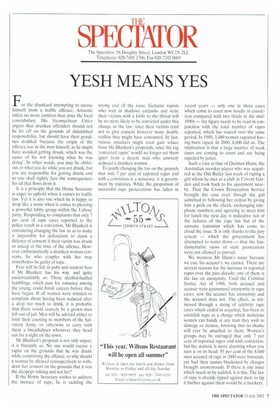YESH MEANS YES
For the drunkard attempting to excuse himself from a traffic offence, Aristotle offers no more comfort than does the local constabulary. His Nicomachean Ethics argues that drunken offenders should not be let off on the grounds of diminished responsibility, but should have their penalties doubled 'because the origin of the offence was in the man himself, as he might have avoided getting drunk, which was the cause of his not knowing what he was doing'. In other words, you may be oblivious to what you do while you are drunk, but you are responsible for getting drunk and so you shall rightly face the consequences for all that flows from it.
It is a principle that the Home Secretary is eager to uphold when it comes to traffic law. Yet it is also one which he is happy to drop like a stone when it comes to pleasing a powerful lobby group within the Labour party. Responding to complaints that only 7 per cent of rape cases reported to the police result in a conviction, Mr Blunkett is considering changing the law so as to make it impossible for defendants to claim a defence of consent if their victim was drunk or asleep at the time of the offence. However enthusiastically a drunken woman consents, he who couples with her may nonetheless be guilty of rape.
Fear will be felt in pubs and student bars if Mr Blunkett has his way, and quite understandably so. Those alcohol-fuelled fumblings, which pass for romance among the young, could finish careers before they have begun. If all women were minded to complain about having been seduced after a drop too much to drink, it is probable that there would scarcely be a grown man left out of jail. Men will be advised either to limit their courting to members of the Salvation Army, or otherwise to carry with them a breathalyser whenever they head out for a night on the town.
Mr Blunkett's proposal is not only unjust; it is blatantly so. No one would excuse a rapist on the grounds that he was drunk while committing the offence, so why should a woman be allowed retrospectively to withdraw her consent on the grounds that it was the alcopops talking and not her?
If the Home Secretary wishes to address the menace of rape, he is tackling the wrong end of the issue. Genuine rapists who wait in shadowy carparks and seize their victims with a knife to the throat will be no more likely to be convicted under this change in the law, since their victims tend not to give consent however many double vodkas they might have consumed. In fact, vicious attackers might even gain solace from Mr Blunkett's proposals, since the tag 'convicted rapist' would no longer set them apart from a decent man who unwisely seduced a drunken woman.
To justify changing the law on the grounds that only 7 per cent of reported rapes end with a conviction is a nonsense; it is government by statistics. While the proportion of successful rape prosecutions has fallen in recent years — only one in three cases which come to court now results in conviction compared with two thirds in the mid1990s — the figure needs to be read in conjunction with the total number of rapes reported, which has soared over the same period. In 1990, 3,400 women reported having been raped. In 2000. 8,600 did so. The implication is that a large number of weak cases are coming to court and are being rejected by juries.
Such a case is that of Quinten Hann, the Australian snooker player who was acquitted at the Old Bailey last week of raping a girl whom he met at a club in Covent Garden and took back to his apartment nearby. That the Crown Prosecution Service brought the case even though the girl admitted to following her ordeal by giving him a peck on the cheek, exchanging telephone numbers and agreeing to meet him for lunch the next day is indicative not of the failures of the rape law but of the extreme feminism which has come to cloud the issue. It is only thanks to the jury system — which the government has attempted to water down — that the fundamentalist views of state prosecutors were not allowed to prevail.
We mention Mr Hann's name because we can; his accuser's, we cannot. There are several reasons for the increase in reported rapes over the past decade; one of them is the law on anonymity. Until the Criminal Justice Act of 1988, both accused and accuser were guaranteed anonymity in rape cases; now the accuser has anonymity and the accused does not. The effect, as witnessed through a string of celebrity rape cases which ended in acquittal, has been to establish rape as a charge which malicious women can bandy at any man they wish to damage or destroy, knowing that no shame will ever be attached to them. Women's groups may be outraged that only 7 per cent of reported rapes end with conviction, but the statistic is more alarming when you turn it on its head: 93 per cent of the 8,600 men accused of rape in 2000 were innocent, yet had their names blackened by charges brought anonymously. If there is one issue which needs to be tackled, it is this. The law of rape is already tipped against men; to tip it further against them would be a mockery.


































































 Previous page
Previous page